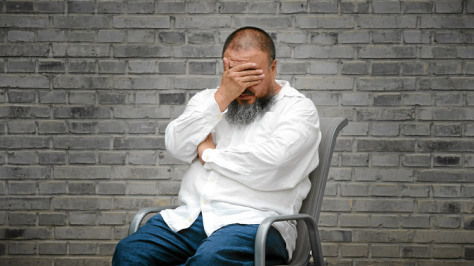I have just discovered, courtesy of the Real Clear Arts, that Ai Weiwei will take questions from attendees of his Ontario exhibition “According to What?” in online chat format.
This exhibition began in 2009 in Mori, Japan. It was reprised this year, starting at the Hirshhorn museum, moving to Indianapolis, stopping now in Ontario en route to Miami and finally Brooklyn.
One wonders how the curators plan to approach this chat experience. Will they be moderating, perhaps even reviewing questions in advance? If so, will they be editing out overtly political content? If not, could this turn into a no-holds-barred discussion of Chinese authoritarianism, political corruption, and all other manner of potentially seditious talk? Obviously, Ai may choose not to answer if he feels line of questioning veering into unsafe territory. But from what we’ve seen of Ai already, self preservation is not the highest on his agenda.
I’m actually thinking that this is potentially a stronger position for Ai than physical presence. In recent years, in fact going back to Wenchuan earthquake project, the internet and related technologies have been key to his development. Planes, taxis, openings and meet-and-greets are all perhaps things of the past for someone as globally inflected as Ai.
Meanwhile, and on the more ponderous end of things, the works actually on display are, from what I can see on the websites, large and weighty, or, in the words of Charles Foran, “massive.” Here is a sample paragraph from his piece on Ai in Canada:
His work embraces one Chinese reality in particular – the gigantic. China has always been out-sized, from its teeming population and its continental dimensions to its massive feats of engineering, both infrastructural and social. It has always required the longest walls and biggest dams and cities that shelter 20-million residents, yet still function.
This from a relatively brief article, but excellent article that appears in The Globe and Mail. Would that more critics willing to put finger to keyboard on the subject of Ai and his politics (and sometimes art) could be as informed as Foran.

Reblogged this on 中国大好き and commented:
The Globe and Mail article is well informed and sympathetic. But it doesn’t spell out any concrete reasons for Ai Weiwei’s singular status. Ai Weiwei’s status, even after his imprisonment, is that of a “princeling”. It seems to be easier to get rid of Bo Xilai. Bo’s father was one of the “eight immortals” of the Communist Party. Ai Weiwei’s father Ai Qing was a persecuted Communist writer, persecuted under Communist rule since the 1940s. Most of his colleagues denounced each other. Among famous writers, few seem to have been as obstinate as Ai Qing. He was banished to an army town in Xinjiang, a huge city today. There he cleaned toilets, together with little Weiwei. But after Deng Xiaoping came to power in 1978, Ai Qing became an icon. Unlike Bo Xilai and his henchmen, Ai Weiwei did not build labor camps and organ-harvested Falungong-followers. Before he was arrested, Global Times had published many sympathetic articles about his civil rights activism. And even after his abduction and imprisonment at an unknown location, Ai Weiwei gets to keep his comparatively huge house and grounds and most of his fortune. If he was persecuted too much, the main reason for Ai Weiwei’s status would come out too clearly: It would be awkward to discuss his father’s fate in detail. Cultural policy since the 1940s is no secret to anybody in and around the arts in China. But still. Maybe it would come out too clearly how control over art and literature and everything connected to culture was deemed even more important than in other Socialist countries. How idealism had been betrayed again and again, most effectively with broad domestic and international participation in economic growth after 1989. Ai Weiwei is very different from his father Ai Qing in many aspects, and also from his older brother Ai Xuan, who is also a well-known artist in China. But like his father, Ai Weiwei remains an icon of idealism. It would be awkward and politically dangerous to challenge such icons and thus revive idealism in a big way.